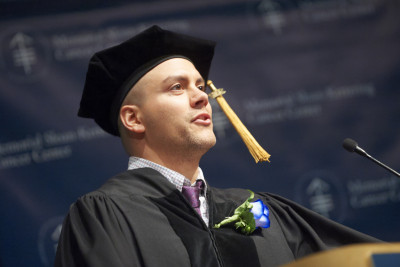
Eric S. Alonzo
Inaugural Commencement
The Louis V. Gerstner, Jr. Graduate School of Biomedical Sciences
Memorial Sloan Kettering Cancer Center
May 11, 2012
Remarks of 2012 Graduate Eric S. Alonzo
Good afternoon. When I first arrived here there were only six of us, all men, and there was an enthusiasm for our arrival because it meant that the GSK experiment was about to begin. However, while there was great interest in our program, I was frequently asked by other NYC graduate students, “Why do we need another PhD program when there are already legions of graduate students in the biomedical sciences?”
To me this was easy to answer. GSK has a different philosophy on graduate student training, one that not only incorporates a didactic curriculum but one that aims to bridge the gap between basic and clinical research, so that future scientists can better understand how to apply or translate their findings more quickly and effectively toward developing new therapies for the treatment of cancer and other diseases.
I believe that an integrative approach to science is fundamental to the future of basic and clinical research. The emphasis on translational research at GSK was truly exciting because it meant that as a bench scientist I had an extraordinary opportunity to apply my work to projects that might be useful someday in a clinic.
As first-year graduate students, we have the unique opportunity to shadow physicians in the clinic and this really gives us insight into the challenges that physicians face daily in the treatment of cancer, with an overall goal of generating a long-term clinical research project. For many this aspect in our program has been truly eye-opening and gave me a new perspective on how I could try to make a difference through my work at the bench, and I was lucky because in the [Derek] Sant’Angelo lab, we had new data that showed that the transcription factor PLZF controlled the unique robust functionality of a small subset of lymphocytes called natural killer T cells.
We also found that overexpression of PLZF and cytotoxic CD8 T cells greatly enhanced their functionality. Therefore, we wondered if we can improve the antitumor effects of tumor-specific CD8 T cells. We began collaborations with the [Michel] Sadelain, [James] Allison, and [Marcel] van den Brink labs to study the effectiveness of these super T cells in mouse tumor models.
This is an ongoing study. I’m excited by our promising results.
To excel in modern biomedical research, I strongly believe that research is needed to develop a broad integrative approach that transcends traditional disciplinary boundaries and divisions common to science education and training of the past.
At GSK, we have one program, which means that throughout our training we’re constantly exposed to the rich diverse research interests of the student body through student-based research seminars and through our journal clubs, where each student is responsible for reading and discussing primary research articles, the topics of which are almost certainly different from their own.
This model of training will give future scientists a greater ability to work across disciplines to solve challenging problems in biomedical research.
I am truly excited for the future of science. I’m particularly excited by the changes that are happening right now in biomedical research. As we move on in our careers, it is time to begin to define what the science of the future will look like. It is also our time to redefine what it is to be a biologist. We are entering an era where research is becoming more integrated, clinicians and scientists speak a similar language, and where exciting advances in technology are pushing scientific exploration to new boundaries.
Like all of you, I’m eager to see where we can take it.
I want to congratulate the members of this year’s graduating class and wish you all the best on your journey of discovery. Thank you.